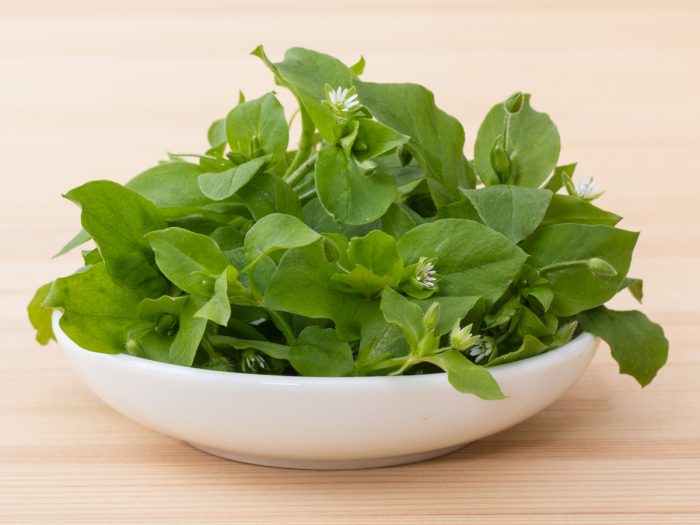Using chickweed tea is a common practice all around the world, and there are a number of health benefits it can provide.
What is Chickweed Tea?
Chickweed tea is a soothing herbal tea brewed from the fresh leaves of the chickweed plant, which bears the scientific name Stellaria media. [1]This plant grows all over the world but is most commonly found in Northern Europe and North America. Among other common names, this plant is referred to as chickenwort, chick wittles, tongue grass, marun, and winterweed. In terms of taste, the tea has a very herbal flavor, reminiscent of a strong pesto or fresh grass. However, the taste doesn’t linger, and the tea is considered quite light in comparison to stronger green teas.
While you don’t benefit from all the nutrients of the plant when you brew the tea, you do get a decent amount of the antioxidants and water-soluble vitamins, such as riboflavin, potassium, vitamins C, B, and D, as well as flavonoids, beta-carotene, and other powerful active ingredients.

Chickweed is used as a cooling herbal remedy. Photo Credit: Shutterstock
Chickweed Tea Benefits
Best benefits of chickweed tea include its ability to aid in weight loss efforts, provide relief from pain and improve respiratory health, among others.
Weight Loss
The most notable effect of chickweed tea is its laxative and diuretic properties. Drinking the tea can help you quickly lose water weight and clear out your bowels, helping you feel more active and improving metabolic speed. [2]
Respiratory Health
Drinking this soothing, natural sedative tea can help to eliminate inflammation in the throat and respiratory tracts. This can also help to neutralize the underlying infection. [3]
Circulation
The active ingredients in this tea are able to slow down clotting factors in the blood, which can prevent blood clots and also lower the levels of plaque deposition in the arteries. [4]
Fibroids
Studies have found that this tea can reduce the size of fibroids in the body.
Natural Sedative
As a natural sedative and pain reliever, this tea is ideal following an injury or illness, or if you are simply struggling to get to sleep each night. [5]
Skin
There are a number of antioxidants, such as flavonoids and beta-carotene, in this tea that can help promote wellness in the skin and reduce the appearance of wrinkles, age spots, and blemishes. [6]
How to Make Chickweed Tea?
Making chickweed tea is quite simple, provided you have access to fresh chickweed.

Healing Chickweed Tea Recipe
Ingredients
- 1 tsp dried chickweed leaves or
- 2 tsp fresh chickweed leaves
- 1 cup water
Instructions
- Thoroughly wash the chickweed tea leaves, dry them and slice them into strips.
- Bring a pot of water to boil.
- Add the fresh chickweed to a teapot or tea infuser.
- Pour over the hot water. Allow the tea to steep for 15-20 minutes. Strain and enjoy!

Chickweed Tea Side Effects
While most people won’t experience side effects, this tea should always be consumed in moderation and should be avoided by those with potential complications, such as women who are breastfeeding or pregnant. Allergies are uncommon for this particular plant, but they do exist and may appear as stomach upset or topical inflammation when handling the leaves.
Due to the relatively small amount of research that has been done on this herbal tea, moderation is strongly recommended for everyone. Speak with your doctor about existing conditions or medications you may be taking before adding this tea to your healthy diet.
